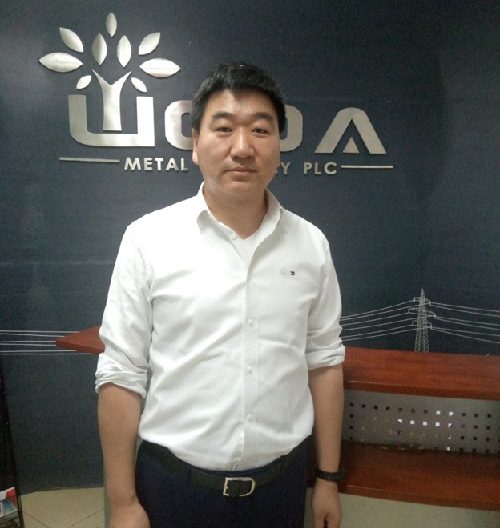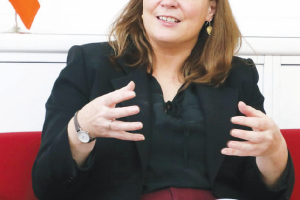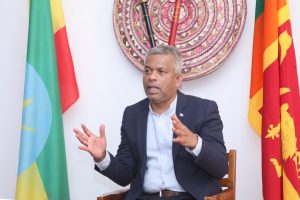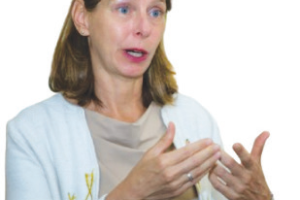
BY GIRMACHEW GASHAW
Today’s Guest Steven Cui is shareholder and General Manager of Woda Metal Industry. He was born in China but raised in Japan. He spent half of his age in Japan. He studied informatics, accounting and information technology.
Before establishing his own business, he had worked for Toyota, Bridgestone and Volvo and STI trading companies in different positions so as to upgrade his business skills.
Considering the investment opportunity available in Ethiopia, he established Woda Metal Industry PLC jointly with other Chinese firms just six year ago.
Together with other companies based in China and Japan, he envisaged to build a medium sized industrial park in Oromia state, Ethiopia.
The Ethiopian Herald made a short stay with Steven Cui to learn more about Woda Metal Industry and the industrial park which will be built in Sebeta, a small town of Oromia state, Ethiopia as well as the impact it would bring for the Ethiopian economy. Have a nice read.
Would you tell us what inspired you to come to Ethiopia and invest in this business?
Actually, we have been doing this business in China for the past 15 years and somehow we are good at it. We are taking 60% share to the Philippines as they were good at making these things. There are a lot of Chinese companies that are already engaged in this business.
Taking this into consideration, the government of China encouraged this kind of business to go out or to be invested outside of China. There is a Belt and Road initiative in China which was promoted in 2015.
Considering the policy, we were searching for good locations for the investment. Finally, we found out that Africa is the last frontier for this business that is blooming before China goes to Southeast Asia.
We found that the market here is very nice. Before we start to produce here, we imported the products from China to supply both for Ethiopia and Kenya as well. Huawei, a leading global provider of information and communications technology (ICT) infrastructure, also encouraged us to bring the manufacturer here. So, we can have a quick delivery with lower cost so as to save some dollars.
And then we found Ethiopia as the best place for the investment due to the sizable population and high demand of the products. The stability and the growing economy is also another factor that inspired us to invest here. We made a tour in Djibouti, Kenya, Somalia and other countries in the horn; however, we couldn’t find a country like that of Ethiopia in terms of political stability and steadily growing economy. We finally choose Ethiopia as the best place for our business considering it is closer to the raw material or the market as well.
Could you tell us what sort of products your company is now producing?
Basically, we are producing three types of products. One is the steel tower which is imperative for power transmission, telecom service and other businesses.
Cable is also another type of product which is mostly used for power transmission lines. It is highly demanded and consumes a huge amount of foreign currency to import.
Hot deeper galvanization is the third product that the company has now produced. The steel tower metal is always getting rusty and the galvanization is applying a protective zinc coating to iron or steel, to prevent rusting. In doing so, it will not rust for 50 or 60 years. So, basically steel tower, cable and galvanization are our current products.
How do you evaluate the overall performance of your company in terms of supplying the products to the international market?
I recently visited Uganda and other countries which have the same demand. However, we did not encourage investing there as the population size of these countries are smaller than Ethiopia. We still export to these countries as Hawaii is pushing us to manufacture here and quick delivery to Kenya and Sudan. We just got this business license last February.
However, due to the expansion of the Corona pandemic, the company lost its appetite to engage in the business. So, our clients are not satisfied. However, because there is high market demand, we are expecting a big shift in the increase side. Basically, our customers like EthioTelecom and Safaricom (the second telecom company investing in Ethiopia) are highly seeking our products and pushing us to be fully operational. We are preparing for this.
Our machine has a capacity to produce 50,000 tons of towers per year and it can fulfill the demand of this country at this moment. We plan to produce 100,000 tons and export 30 percent of the produce.
With regard to cable, the company has a capacity to produce 30,000 tons of cable per year. There are five cable producing companies in this country but we have the biggest in capacity.
Concerning galvanization, our company has a capacity to produce around 60,000 tons per year. Thus, we are the one and only one with this capacity in East Africa.
Would you tell us some of the challenges the company has been facing?
I think everybody has been facing a shortage of dollars in order to supply raw material as per the level of desire. On one hand, the country is allocating a huge amount of foreign currency for importing finished goods. On the other hand, we have the capacity to produce the imported products but suffer a lot to import raw materials as there is a shortage of hard currency. I think the policy should be wise and consider all those things while allocating dollars.
We are applying for dollars so as to purchase raw material but we are still waiting for a long time. So, this kind of policy should be revised. This is one of the biggest challenges for us.
The bureaucracy observed in some offices is one discouraging factor to invest in this country. Started in 2016, the construction of the facility was finalized in 2021. In China, an investment of this kind finalizes within a year. Here, everything is moving very slowly.
After we purchased the land for this project, some people encouraged us to construct the factory. However, there was no water supply there until we solved it by spending some amount of money. In the middle of the construction, officials told us that there was no electricity as the power substations in nearby areas were overloaded. Later on, we managed everything through building the substation with a capacity of 150 Megawatt.
Logistic is another headache. We are paying huge amounts of demurrage as there was no truck for some time. The train route which takes logistics directly from Addis to Djibouti port is a wonderful option for logistics. However, it is expensive and sometimes equivalent with the price required paying for trucks.
Would you tell us your plan to increase products so as to meet the local demand?
Here, the company has been following two directions. With regard to Woda Metal Company, in the first Phase, it produces 50,000 tons of tower, 30,000 tons of cable and 50,000 tons for galvanization per year. When it is fully operational or operating in its full capacity, it will reach 200 million USD equivalent sales. This means, we will expend 100 million USD to import the raw material. If we hit 200 million USD sales, we can fulfill local demand and save 100 million USD for this country.
In the second phase, we will increase our capacity so as to supply the produce to the surrounding countries. So, we double the existing production capacity and reach 400 million USD sales. So, the first phase is already successful. We are now planning to fulfill the demand of surrounding countries and increase the sales to 300 or 400 million USD. At this level, we export half of the produce and cover the local demand with the remaining one.
On the other hand, Woda investment group (our company and sister companies) aim to construct a medium sized Industrial Park in Oromia state, Ethiopia. The group has allocated 95 million USD for the development of infrastructure and other facilities in a total area of 100 hectares.
So far, Memorandum of Understanding (MOU) has been signed among sister companies, who are interested to engage in various business such as vehicle assembling, home appliance, tier factory, food processing including avocado oil. The park is high end and compacted one. The company has already built a 50 megawatt power substation for the park and various activities are carried out to secure the land allotted for the project. Upon completion, the newly established industrial park will create 1,000 jobs. When it goes to be fully operational, it would create over 10,000 jobs.
The Woda and its sisterly companies aimed at minimizing the hard currency of the country that is flowing to import the same product that will be produced with the capacity of these companies. The industry park will produce 30-50 percent of the products for export.
If you look at Kilinto Industrial Park, many industries are not interested to come as the size and rental or lease payment for the shed is expensive.
How do we explain the relations that your company has established with stakeholders?
Since the project is not a small one, it can attract the attention of many government officials and they are happy by the performance of the company. Many of the government institutions are now encouraging investors through amending policies and directives. They are now providing due support for the organization to realize their vision. So at this moment, I think we have good relations.
If you go down the ladder, we have already established wonderful relations with the farmers and local authorities. Since the start up of the project, the farmers are showing good gesture and cooperating with us by leaving the land considering the impact of the project on the lives of the overall people. Of course, we pay the compensation apart from promising to bring them to work. Even if there is some bureaucracy there, we are working with the Ethiopian investment commission and other officials at the federal and state levels.
What are the mechanisms the company is using to produce quality products which fit international standards?
A quality management system (QMS) is a system that documents the policies, business processes, and procedures necessary for an organization to create and deliver its products or services to its customers, and therefore increase customer satisfaction through high product quality.
When I worked in Toyota, Bridgestone and other companies, I learned QMS is the first priority given to ensure quality of products. Basically, my manufacturer identity is adapted from this Japanese device and we focus on quality. The policy and even our single way of thinking have given special consideration to quality.
With regard to the industry park project, we choose the well-known brands from China and Japan. So, these companies are well organized and have their own quality management systems. Our own team which is drawn from China, Japan, USA and Germany are also assisting us to produce high end products. So, all the projects have their own quality management system. So, the industrial park which we want to build is also focused on companies with well known brands.
If our products are not accepted by our customers, we will not exist as the manufacturer. We do not want to be offline from the business for the coming 20 to 50 years. So, quality is the first priority.
As an investor, what do you recommend to further develop the manufacturing sector in Ethiopia?
Build a road. China, for the last 30/40 years, has a very quickly growing economy. When I was young, I always heard one saying “If you are going to be rich, build a road first to invite people to come in.”
The very problem for this country is you don’t have a sea port and the raw material. It may take a long time to supply raw material. In order to get these basics, it may take time. Even if the country has underground resources, it has not yet managed.
In order to manage the resource at your hand, it may take a long time as it requires huge investment. Due to this, we have to import the raw materials paying hard currency. In order to construct a tower, for instance, we brought raw materials from China.
As I said before, the cost of logistics should also be improved. You can go everywhere quickly and easily.
Policy wise, I know that the government has been working a lot of positive tasks to provide incentives to encourage investors but there still requires you to do so in terms of minimizing taxation and providing other incentives. In order to cut the long bureaucracy system, the nation should applying easy doing business mechanisms.
I thank you very much.
It is my pleasure.
The Ethiopian Herald June 11/2022




